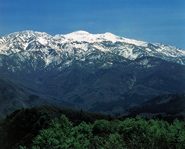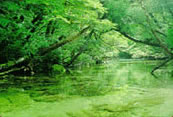Japan and the Man and the Biosphere Programme (MAB)
The Man and the Biosphere Programme ( MAB ) of UNESCO was launched in 1971. MAB develops the bases of a sustainable balance between the conservation of cultural diversity and a reasoned exploitation of the resources necessary to the development of a better relationship between people and their environment through interdisciplinary research, training of executives and dissemination of information.
MAB's activities are coordinated by the national committee of each country.
The "Biosphere Reserves", world network of protected zones, are one of the most famous aspects of MAB. In Japan, 4 Biosphere Reserves were approved in 1980:
Mount Hakusan © Japan Photo Encyclopedia
2 Mount Odaigahara & Mount Omine
4 Yakushima Island, also on the World Heritage List
Yakushima Island© All rights reserved
Within the framework of MAB, Japan finances the "Asia-Pacific Cooperation for the Sustainable Use of Renewable Natural Resources in Biosphere Reserves and Similarly Managed Areas" (ASPACO). This project, whose main focus is sustainable development, particularly aims at protecting coastal zones, small islands and mangrove swamps.
Japan also belongs to the Southeast Asian Biosphere Reserve Network (SeaBRnet) created in 1998 on the initiative of its eight members and the East Asian Biosphere Reserves Network (EABRN).
Links
:
Japanese National Committee of MAB
Japanese National Commission for UNESCO's website - Japanese Cooperation in Sciences
Ministry of Education,Culture,Sports,Science & Technology in Japan
Legal Matters | About Accessibility | Privacy Policy
Copyright : 2013 Permanent Delegation of Japan to UNESCO


